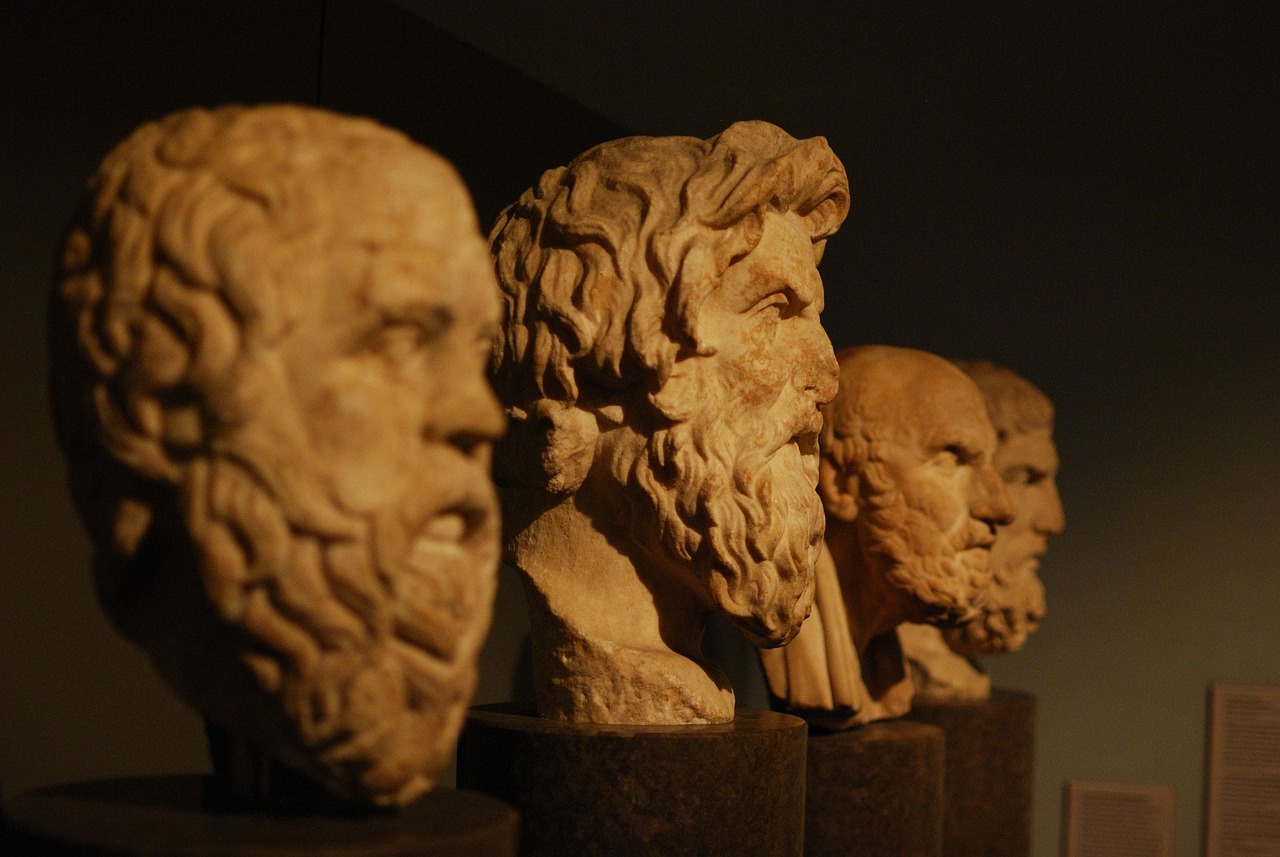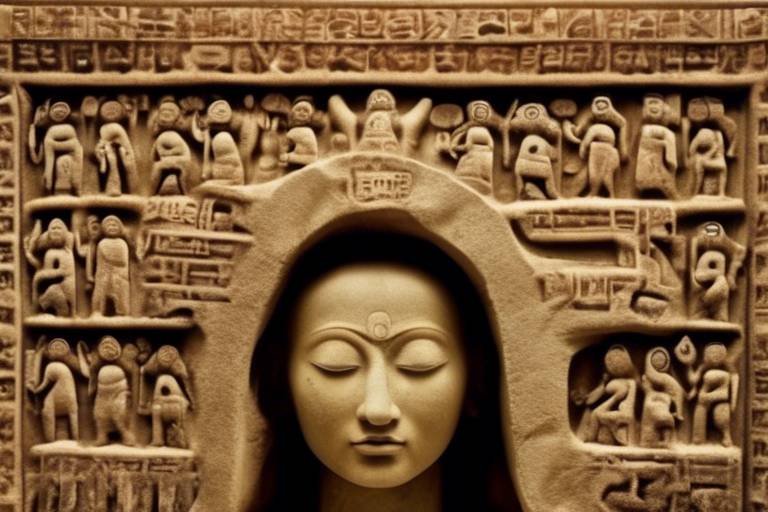The Influence of Ancient Eastern Philosophies on Western Thought
Eastern philosophies, with their deep-rooted wisdom and profound insights, have had a profound impact on the intellectual and cultural fabric of the Western world. The fusion of Eastern and Western ideas has created a rich tapestry of thought that continues to shape modern society in significant ways.
As ancient Eastern philosophies such as Buddhism, Confucianism, and Taoism made their way to the Western world, they brought with them unique perspectives on life, existence, and the nature of reality. These philosophies, distinct from the traditional Western philosophical traditions, offered new ways of understanding the world and our place within it.
The historical encounters and exchanges between Eastern and Western cultures played a crucial role in the dissemination of Eastern philosophies in the West. Through trade routes, diplomatic missions, and the translation of ancient texts, the wisdom of the East found its way into the hearts and minds of Western thinkers and scholars.
Philosophical syncretism, the blending of Eastern and Western philosophical ideas, gave rise to new schools of thought and belief systems that reflected a harmonious integration of diverse cultural perspectives. This synthesis of ideas led to the emergence of novel philosophical frameworks that challenged traditional Western paradigms.
Influential Western thinkers such as Nietzsche, Schopenhauer, and Emerson were deeply inspired by Eastern philosophies, incorporating concepts like mindfulness, interconnectedness, and non-duality into their philosophical works. The influence of Eastern thought on these luminaries reshaped the landscape of Western philosophy and paved the way for new intellectual inquiries.
Ancient Eastern philosophies continue to resonate in contemporary Western thought, permeating fields such as psychology, medicine, mindfulness practices, and ethical decision-making. The enduring relevance of Eastern wisdom in modern society underscores the timeless nature of these philosophical traditions.
The artistic and cultural influences of Eastern philosophies on Western art, literature, music, and architecture have given rise to new artistic movements and cultural expressions that blend Eastern and Western aesthetics seamlessly. This cross-pollination of artistic styles has enriched the cultural landscape of the Western world.
Despite the positive impact of Eastern philosophies on Western thought, challenges and criticisms have emerged regarding issues of cultural appropriation, misinterpretation, and the commercialization of spiritual practices. These challenges highlight the need for a nuanced and respectful engagement with Eastern philosophies in the Western context.
Looking ahead, the potential for further dialogue and collaboration between Eastern and Western philosophical traditions holds promise for fostering a more interconnected and harmonious global society. By cultivating mutual understanding and respect, we can continue to draw upon the wisdom of both Eastern and Western philosophies to navigate the complexities of the modern world.

Introduction to Eastern Philosophies
Eastern philosophies, including Buddhism, Confucianism, and Taoism, offer a unique perspective on life, existence, and the universe. These ancient philosophies have deep roots in Eastern cultures and have influenced the way people perceive the world around them. Unlike Western philosophical traditions that often focus on individualism and rationality, Eastern philosophies emphasize interconnectedness, harmony, and spiritual enlightenment.
One of the key principles of Eastern philosophies is the concept of impermanence, the idea that everything in the world is constantly changing and evolving. This belief is central to Buddhist teachings, which encourage followers to embrace change and impermanence as natural aspects of life. Similarly, Taoism emphasizes the importance of living in harmony with the natural world and following the flow of the Tao, or the way of the universe.
Confucianism, on the other hand, focuses on ethics, morality, and social harmony. The teachings of Confucius emphasize the importance of filial piety, respect for authority, and the cultivation of virtues such as benevolence, righteousness, and propriety. These principles have had a profound impact on the social and political structures of many Eastern societies.
Overall, Eastern philosophies provide a holistic approach to understanding the world, integrating spiritual, ethical, and practical aspects of life into a coherent worldview. By exploring the fundamental principles of Buddhism, Confucianism, and Taoism, we can gain valuable insights into the rich tapestry of Eastern thought and its enduring influence on global culture.

Early Encounters and Exchanges
Early encounters and exchanges between Eastern and Western cultures have played a pivotal role in shaping the intellectual landscape of the Western world. Through historical interactions such as trade routes and diplomatic missions, the East and West have engaged in a rich exchange of ideas, leading to the introduction of key Eastern philosophies to the Western consciousness. These encounters not only facilitated the transmission of ancient texts but also sparked a profound curiosity and fascination with the philosophical traditions of the East.
One significant aspect of these exchanges was the translation of foundational Eastern texts into Western languages, allowing scholars and thinkers in the West to delve into the profound insights and wisdom contained within works such as the Tao Te Ching and the Bhagavad Gita. As these texts found their way into the hands of Western intellectuals, a new world of philosophical exploration and contemplation opened up, challenging traditional Western modes of thinking and prompting a reevaluation of fundamental beliefs and values.
The cultural and intellectual encounters between the East and West not only led to the dissemination of Eastern philosophical ideas but also sparked a process of cross-cultural fertilization. As Eastern and Western thought systems intermingled, a process of syncretism emerged, giving rise to new schools of philosophical thinking that blended elements from both traditions. This fusion of ideas and beliefs gave birth to innovative philosophical perspectives that transcended geographical and cultural boundaries, enriching the intellectual tapestry of both worlds.

Philosophical Syncretism
Philosophical syncretism is a fascinating concept that embodies the harmonious blending of Eastern and Western philosophical ideas, creating a rich tapestry of thought that transcends cultural boundaries. Imagine it as a vibrant mosaic where pieces of ancient wisdom from different parts of the world come together to form a new and intricate pattern, each fragment contributing its unique color and texture to the overall design.
This fusion of philosophies goes beyond mere juxtaposition; it involves a deep integration and mutual influence, where ideas from diverse traditions interact and evolve, giving rise to novel perspectives and belief systems. It's like a philosophical dance where the steps of Confucianism gracefully intertwine with the movements of existentialism, creating a mesmerizing choreography of thought.
Through philosophical syncretism, concepts such as karma from Hinduism may find resonance with the notion of cause and effect in Western philosophy, leading to a deeper understanding of interconnectedness and universal principles. This blending of ideas not only enriches individual philosophies but also paves the way for the emergence of hybrid philosophies that bridge cultural divides and offer fresh insights into the human experience.
Picture a meeting of minds where Lao Tzu's teachings on simplicity and spontaneity engage in a profound dialogue with the existential angst explored by Kierkegaard, resulting in a philosophical synthesis that transcends geographical and temporal boundaries. This cross-pollination of ideas sparks intellectual creativity and fosters a spirit of openness and receptivity to diverse worldviews.

Impact on Western Thinkers
Eastern philosophies have had a profound impact on Western thinkers throughout history, sparking a wave of inspiration and influencing the development of new ideas and perspectives. Visionary Western philosophers such as Nietzsche, Schopenhauer, and Emerson were among those deeply moved by the wisdom and insights found in Eastern philosophical traditions.
These Western thinkers were drawn to concepts such as mindfulness, interconnectedness, and non-duality, which challenged conventional Western beliefs and offered alternative ways of understanding the world. By integrating elements of Eastern philosophies into their own work, these thinkers enriched Western intellectual discourse and expanded the boundaries of philosophical exploration.
For Nietzsche, the concept of eternal recurrence, inspired by Eastern notions of cyclical time, played a significant role in shaping his philosophy of amor fati, or love of fate. Schopenhauer, heavily influenced by Buddhist teachings on suffering and desire, developed his philosophy of pessimism and the will to live. Emerson, a proponent of Transcendentalism, embraced the idea of self-reliance and spiritual intuition drawn from Eastern spiritual practices.
By incorporating Eastern philosophical principles into their writings and teachings, these Western thinkers not only broadened their own philosophical horizons but also contributed to the cross-pollination of ideas between East and West, fostering a rich tapestry of thought that continues to inspire and challenge contemporary thinkers.

Modern Applications and Interpretations
Modern Applications and Interpretations of ancient Eastern philosophies in Western society have been profound and far-reaching. These philosophies have not only influenced individual beliefs and practices but have also made significant contributions to various fields, shaping the way we approach psychology, medicine, mindfulness practices, and ethical decision-making.
One of the key areas where the impact of Eastern philosophies is evident is in the field of psychology. Concepts such as mindfulness, meditation, and the interconnectedness of all beings have been integrated into therapeutic approaches, leading to the development of mindfulness-based interventions and cognitive-behavioral therapies that draw on ancient Eastern wisdom.
In the realm of medicine, the principles of traditional Eastern healing practices like Ayurveda and Traditional Chinese Medicine have gained recognition in Western healthcare systems. The emphasis on holistic well-being, the balance of mind, body, and spirit, and the use of natural remedies have influenced alternative and complementary medicine approaches, offering patients a more integrative and personalized healthcare experience.
Mindfulness practices, rooted in Eastern contemplative traditions, have also found widespread application in Western society. From stress reduction techniques to corporate wellness programs, mindfulness has become a mainstream practice that promotes mental clarity, emotional regulation, and overall well-being, catering to individuals seeking inner peace and balance in a fast-paced world.
Moreover, the ethical principles embedded in Eastern philosophies, such as compassion, non-violence, and interconnectedness, have informed ethical decision-making frameworks in various sectors. From business ethics to environmental sustainability initiatives, the emphasis on harmonious relationships, social responsibility, and environmental stewardship reflects a shift towards more conscientious and values-driven practices in Western culture.
In essence, the modern applications and interpretations of ancient Eastern philosophies in Western thought demonstrate a harmonious blend of tradition and innovation, offering valuable insights and practices that resonate with contemporary challenges and aspirations.

Artistic and Cultural Influences
Eastern philosophies have not only influenced the intellectual and spiritual realms but have also made a significant impact on Western art, literature, music, and architecture. The infusion of Eastern philosophies into Western artistic expressions has led to the emergence of new movements and styles that blend the aesthetics and principles of both traditions.
For example, the concept of mindfulness from Buddhist philosophy has inspired artists to create works that evoke a sense of presence and awareness. This can be seen in contemporary art pieces that encourage viewers to engage with the present moment and reflect on their inner thoughts and emotions.
In literature, the themes of interconnectedness and harmony found in Taoism have influenced Western writers to explore the relationships between individuals and the natural world. Authors have incorporated these ideas into their narratives, creating stories that emphasize the interconnectedness of all living beings.
Music has also been deeply impacted by Eastern philosophies, with musicians drawing inspiration from traditional Eastern melodies and instruments. This fusion of musical styles has given rise to unique compositions that blend Eastern and Western musical traditions, creating a harmonious blend of sounds and rhythms.
Architectural designs have been shaped by Eastern philosophies as well, with buildings and structures incorporating elements such as symmetry, balance, and minimalism inspired by Eastern architectural principles. This integration of Eastern design aesthetics has resulted in the creation of spaces that promote tranquility, simplicity, and a sense of unity with the surrounding environment.

Challenges and Criticisms
When exploring the integration of Eastern philosophies into Western thought, it is essential to address the challenges and criticisms that arise from this cultural exchange. One of the primary concerns is the issue of cultural appropriation, where Western individuals or institutions adopt elements of Eastern philosophies without understanding or respecting their cultural significance. This can lead to a superficial understanding of complex philosophical concepts and practices, diluting their true essence.
Additionally, misinterpretation is a common challenge when Eastern philosophies are translated and interpreted through a Western lens. The nuances and subtleties of these ancient traditions can be lost in translation, leading to misunderstandings and misrepresentations that distort the original teachings. It is crucial to approach the study and application of Eastern philosophies with sensitivity and a willingness to engage deeply with the cultural context from which they originate.
Furthermore, the commodification of spiritual practices derived from Eastern philosophies is a significant criticism in modern society. The commercialization of mindfulness, yoga, and other contemplative practices can strip them of their spiritual and philosophical foundations, turning them into mere commodities for profit rather than tools for personal growth and self-discovery. This commercialization can also perpetuate stereotypes and clichés about Eastern cultures, reducing them to marketable trends.
In navigating these challenges and criticisms, it is vital for individuals and institutions in the Western world to approach the integration of Eastern philosophies with humility, respect, and a genuine desire to learn and engage with these rich traditions authentically. By acknowledging the complexities and nuances of Eastern thought and fostering a spirit of dialogue and mutual understanding, we can overcome these challenges and create a more harmonious synthesis of Eastern and Western philosophies.

Future Intersections and Dialogue
As we look towards the future, the potential for further intersections and dialogue between Eastern and Western philosophical traditions holds great promise. By fostering mutual understanding and respect, we can pave the way for a more interconnected and harmonious global society. This dialogue is not just about exchanging ideas but also about cultivating a shared sense of humanity that transcends cultural boundaries.
Through open and respectful communication, we can bridge the gap between different philosophical perspectives and find common ground that enriches both traditions. By embracing diversity and engaging in meaningful conversations, we can create a tapestry of thought that celebrates the richness of human experience.
Future intersections between Eastern and Western philosophies offer an opportunity for growth and enlightenment, allowing us to explore new ways of thinking and being in the world. By coming together in a spirit of curiosity and collaboration, we can build bridges that span continents and centuries, connecting the wisdom of the past with the possibilities of the future.
Frequently Asked Questions
- What are the key Eastern philosophies that have influenced Western thought?
The key Eastern philosophies that have influenced Western thought include Buddhism, Confucianism, and Taoism. These philosophies have introduced concepts such as mindfulness, interconnectedness, and non-duality to Western thinkers.
- How have Eastern and Western philosophical ideas merged to create new belief systems?
The process of syncretism has led to the merging of Eastern and Western philosophical ideas, creating new schools of thought that reflect a blend of cultural perspectives. This fusion has given rise to unique belief systems that continue to shape modern society.
- Which Western thinkers have been inspired by Eastern philosophies?
Influential Western thinkers such as Nietzsche, Schopenhauer, and Emerson have been inspired by Eastern philosophies. They have incorporated concepts from these philosophies, such as the importance of mindfulness and the interconnectedness of all things, into their own works.
- How do ancient Eastern philosophies continue to impact modern Western thought?
Ancient Eastern philosophies continue to resonate in contemporary Western thought by influencing fields such as psychology, medicine, mindfulness practices, and ethical decision-making. These philosophies offer valuable insights that are still relevant in today's world.
- What challenges and criticisms arise from integrating Eastern philosophies into Western thought?
Challenges and criticisms that arise include issues of cultural appropriation, misinterpretation, and the commodification of spiritual practices. It is important to address these concerns while appreciating the contributions of Eastern philosophies to Western intellectual and cultural development.
- Is there potential for further dialogue and collaboration between Eastern and Western philosophical traditions?
Yes, there is potential for further dialogue and collaboration between Eastern and Western philosophical traditions. By fostering mutual understanding and respect, we can create a more interconnected and harmonious global society that benefits from the wisdom of diverse philosophical perspectives.



















